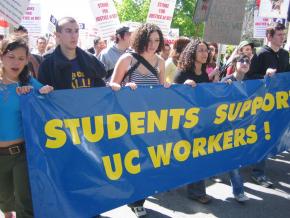UC strikers defy judge’s order
reports on the first day of a one-week walkout by University of California service workers.
UNIVERSITY OF California (UC) service workers at 10 campuses and five UC hospitals walked off the job July 14, beginning a five-day strike in defiance of a judge’s restraining order.
The 8,500 workers, members of AFSCME Local 3299, include groundskeepers, janitors, cafeteria workers and technicians at the university medical centers. They earn as little as $10 an hour—poverty wages, according to the union.
Instead of offering significant wage increases to bring workers’ pay into line with their counterparts at other institutions, school officials have refused to guarantee even a penny of cost-of-living increases. UC’s proposed increase in the minimum wage wouldn’t even effect workers in Northern California and the medical centers, who already earn more.
Meanwhile, the administration is saddling already under-compensated AFSCME workers with increases in parking and health care costs.
"It's unfortunate that after almost a year of negotiating, it has come to a strike," UC-San Diego employee Angela Vasquez told a local television station. "But with gas and food prices, our families are in crisis. We cannot wait another month for UC executives to end poverty wages—my family could be homeless by then."

UC prefers to hide behind the claim that it needs to know the details of a still-to-be-approved state budget to determine what it will be able to afford to pay service workers. In fact, a mere 8.6 percent of Local 3299 workers’ wages are funded by the state budget. As a neutral investigation undertaken by a state-appointed fact-finder confirmed, the university has ample funds to meet the workers’ wage demands, independent of the state budget.
Meanwhile, UC has hired a new president, Mark Yudof, with annual pay, perks and benefits worth nearly $1 million. Adding insult to injury, Yudof quipped at a press conference, “As you can see from my compensation package, I'm not starving to death."
While the system happily spends an estimated $9 million on housing renovations for its new president, AFSCME workers earn 25 percent less than the average for workers in comparable positions at community colleges in the state. The pay is so low that a staggering 96 percent of UC workers qualify for public assistance, according to AFSCME local 3299 researchers.
After months of negotiations and two months of deadlock, AFSCME is taking to the picket lines from July 14-18 across California.
A successful strike could give confidence and inspiration to other workers faced with dark times on the economic horizon. But administrators are taking a page out of the book of corporate behemoths like Wal-Mart.
As AFSCME’s 8,500 service workers prepared to strike, UC turned to the nation’s largest union-busting law firm, Littler Mendelson, which represents Wal-Mart in an ongoing lawsuit contesting discrimination against women in the company’s employment practices
Littler Mendelson helped the university obtain a restraining order from a San Francisco judge. But AFSCME’s strike went forward anyway.
“We think the strike is legal, and will fight the charges in court,” said Kathryn Lybarger, a AFSCME Local 3299 bargaining committee member. “We refuse to let an anti-union PERB (Public Employment Relations Board) and a union-busting law firm trample the fundamental lawful right that workers have won to go on strike.
“What should be on trial is not the struggle of thousands of workers to pull themselves out of poverty, but the fact that an employer like UC would attack its lowest-paid workers, instead of focusing on paying its workers a livable wage.”
While the local’s patient care workers are not being brought out on strike, thousands plan to honor the service workers’ picket lines.
UC’s shameless tactics make solidarity with Local 3299 workers all the more critical. In Santa Cruz, students organized in the Student/Worker Coalition for Justice have been campaigning for support for AFSCME for months. Rallies and meetings held with the union helped raise the visibility of UC workers and their struggle for a just contract. And students and community members are walking the picket line with workers at many campuses.
The strikers are also building solidarity with other struggles, including the victims of recent Bay Area ICE raids on the El Balazo taqueria chain. AFSCME Local 3299 passed a resolution in support of the El Balazo workers, promising both financial and active support for their continuing defense campaign.


